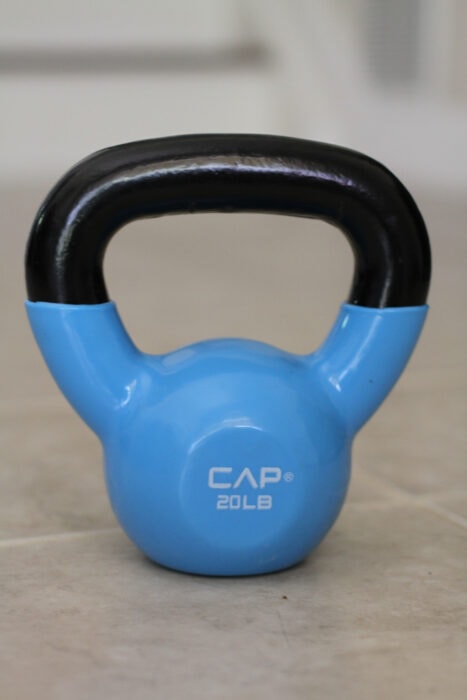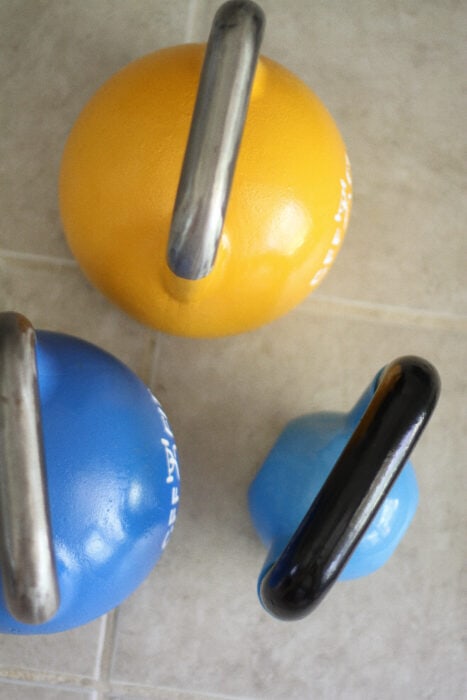During our Meet a Frugal Girl Reader series, a number of the interviewees shared about their efforts to pay their mortgages off, and that sparked discussion in the comments, weighing the virtues of investing vs. paying off a mortgage.
(Which is fine. It’s all been polite and calm!)

Reading these discussions has gotten me thinking about how sometimes, we make decisions that are not the Optimal Very Most Best Decision According to the Numbers. And I personally think that’s ok, as long as the general direction of your financial decisions is good.
Most of us aren’t living a fully optimized life in any area.
We’re not eating the very healthiest diet we could.
We’re not spending our time 100% efficiently.
We’re not spending 100% of our time at work doing optimal tasks.
We’re probably not maintaining an optimized exercise routine.
I think that if we focus too much on full optimization, we risk losing longevity.
What do I mean?
Well, take exercise as an example.

If you know a fully optimized routine would involve weights 4x/week and running on the other days, but you loathe running….well, you probably are not going to stick to that routine for very long.

It would be better to do a weights routine combined with walking if that’s what you could actually stick with.
Better to do a walking/weights combo for the rest of your life than to do a running/weights combo for a month (followed by quitting exercise altogether for a while).

The same could be applied to what you eat. If you try to eat a fully optimized diet with no treats whatsoever, you are going to have serious trouble sticking to that for the rest of your life.

It would be better to try something less optimized if it meant you could actually stick to it for the rest of your days.

Cookies will always be in my diet. And so will salads. 😉
Sometimes I think about this principle when I read blogging/business advice. There are a lot of things I could be doing differently to optimize my blog and to monetize it better.
But sometimes, those thing would make me hate blogging. And if I start to hate blogging, odds are good that I will quit. I’ve been doing this since 2008 because I find it to be mostly fun and rewarding.
If I make a bunch of smart monetization moves, but then I quit blogging, I will not, in fact, be money ahead! Better to pick something I can stick with.
Anyway. All of those non-monetary examples illustrate a principle that can easily apply to money as well.
A sustainable plan has to be something that you feel good about and that you can stick to.
This is exactly why people often begin a debt pay-off plan by socking it to the smallest debt, even if it doesn’t have the highest interest rate. The quick win and the satisfaction of feeling progress means people are more likely to stick with the debt pay-off efforts.
So, even if it doesn’t make as much sense on paper, if this method helps people hang in there with debt payoff, it’s worth it.
Paying off a huge, high-interest debt can be a demoralizingly slow process, and it might cause someone to stop trying. And then that whole, “This is, mathematically, the smartest way to pay off debt.” argument becomes rather invalid.
With almost anything in life, longevity of a habit is one of the top contributors to success. Steady plodding will get you so much further than a sprint-then-quit approach.

When it comes to the pay off the mortgage vs. invest the money and then pay off the mortgage debate: yep, on paper, the latter is smarter.
But some people have good reasons for wanting to knock out that mortgage, like that they are older, or that there’s been housing insecurity in their past.
Money decisions are not always about the numbers.
Plus, it’s not like you have to make a black and white decision between either of these two choices.
For instance, if you have $500/month to spread between the two options, you could send half toward the mortgage principal each month and you could invest the other half.
_______
So, I think the correct solution to this issue depends on lots of individual factors, which means the “right” answer will vary from person to person.

Nan
Saturday 15th of October 2022
I bought a house later in life. I put down nearly 30% of the mortgage and made double payments many months. I didn’t want a mortgage when I retired. I worked an “extra” year before retiring. I had a paid off mortgage in 7 years. (I drove a good used car had 11,000 miles on it when I bought it until I traded it in at 165,000 miles after I retired and never any major problems). Going into retirement with no mortgage (and no other major debts) was a best money decision I’ve never regretted. I feel blessed I could do this. I never “see” the money for taxes as part of my income f automatically goes in a bank account set up just for that. When taking out my mortgage, I never had taxes rolled into that but paid taxes separately. I had to sign a form acknowledging that I understood, I’d have a tax bill yearly!
Nicole
Saturday 15th of October 2022
We also chose to pay off our home early because I was a stay-at-home mom and my husband was in a creative field without a lot of potential for income growth. It was a way for us to gain security and increase cash flow. It took us six years (we bought a home that was less than we qualified for). We did it while our kids were little, when clothes and shoes and recreation were still cheap. As they've gotten older, we've felt so grateful to have that extra money to spend on music lessons, etc. Now my husband is moving into a more lucrative field, and I've gone back to work part-time, and we can increase what we've been investing. Overall, this choice has been a good one for our family.
Jen Martinez
Friday 14th of October 2022
My goal is to have a paid for home before retiring. However, life has its twists and turns and I'm rebuilding after a divorce. My goal is still attainable just got derailed a little
EngineerMom
Friday 14th of October 2022
I land on "Do money things in a specific order that reflects my values and priorities."
So, for us, that's 1. Our current living situation (money spent towards things like replacing the windows, replacing siding that's being damaged by woodpeckers, or regrading the backyard so that it isn't constantly flooding in every rainfall and we can actually use the space). This includes paying down some financing we've had to take out. 2. Our retirement 3. Our modes of transportation (keeping our cars and bikes in good repair) 4. Our children's education (sometimes that meant paying for a private Montessori, right now it's more focused on saving some money towards education/training after high school).
5. Paying off the mortgage.
Paying off our mortgage is at the bottom of our financial list right now. That may change the closer we get to retirement, specifically when we no longer have under-18 kiddos at home. Our interest rate is so low that it doesn't make a lot of financial sense *to us* to pay that loan down quickly - we'd rather invest in our retirement, and continue paying the minimum towards the mortgage.
Because property taxes are so high where we live, only about half of our "mortgage" even goes towards interest and principal - the rest is property taxes, which will never go away. So we're not exactly financially motivated to continue pouring today's dollars into the principal.
Kristen
Friday 14th of October 2022
If you and Rose were having a one-on-one conversation, I would take no issue. But the difficulty in a public forum is that when someone says something definitive, like that the expression of preferring experiences to things is a holier-than-thou type of thing, then that person is making a judgment about all the people here who DO have that preference.
And while it is true that some people have a holier-than-thou attitude about it, there are also people who have a humble, non-judgmental attitude about experiences over things. It's not fair or kind to paint them with a broad brush any more than it is kind to paint "things-over-experiences" people with a broad brush.
I get that you personally weren't offended; I just do not want to create or cultivate an atmosphere here where we broad-brush people with negative descriptors.